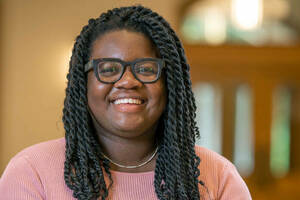
Euda Fils is a first year Master of Global Affairs, International Peace Studies student. A Haitian, she moved to Florida when she was nine. Euda studied economics and was a Peace Corps volunteer before joining the Kroc Institute. She wants to work in corporate social responsibility after she graduates and help grow community networks.
What drew you to the Master of Global Affairs program?
I was always interested in the questions of why Haiti was the way that it was, and the United States and other nations were the way they were. I got into economics to try to find an economic solution through development for Haiti. After I joined the Peace Corps, I decided I wanted to do development work on the ground. This is what really drew me here.
I remember distinctly that when I was applying, I was deciding between Sustainable Development and Peace Studies [two concentrations within the Master of Global Affairs program]. So I looked into my heart and thought about what I wanted to do. I realized that peace was the ultimate good because we do development work in order to promote peace.
What did you do before joining the Kroc Institute?
I worked in the recruitment field, specializing in aerospace and defense in New York. My job and co-workers were fine, but I felt that was not what I wanted to do. I joined the Peace Corps, where I worked with a women's organization in a medium-sized town in Kosovo. We mostly helped rural women, so it was about getting large farming equipment and teaching them new methods of farming so they could be connected to the global supply chain. For example, we convinced women to switch from producing corn to growing tea flowers organically, and then selling them to one of the largest businesses in Kosovo. Right before my evacuation due to the pandemic, we also taught them how to do beekeeping so they could sell the honey and byproducts as well as start their micro businesses using the proceeds.
I also feel that my goal there was sisterhood. Many women in Kosovo don’t go out without their husbands and only know their neighbors, so women don’t exist in the public sphere on their own. We organized gatherings and tea times for women to meet and connect. We also did study travel visits because many women never left their little town in Kosovo. With us, they saw different places around the country where they also met organic farmers. That made me think that I wanted to do this type of work for the rest of my life, and so I came to the Kroc Institute.
What has been your favorite class so far?
I enjoyed them all, so it’s hard to pick a favorite. I really like “Developing a Peacebuilding Practice” with Susan St. Ville and Jen Betz because it was a good opportunity for our cohort to talk to one another and learn the realities when working in peacebuilding on the ground. I also really like “Foundations of Peace Studies” [taught by Ann Mische] because it introduced me to a lot of different aspects and theories of peacebuilding. This is what I was looking for when I applied.
What kind of work would you like to do after you graduate?
I had a shift because earlier I wanted to go back and do the exact type of work I was doing in the Peace Corps: being on the ground with a small organization. Now I want to work in corporate social responsibility. I like the community building potential in this field. A lot of corporations have their headquarters in some place, but they don't feel connected to it, so they also don’t feel responsible for the community that they're in. Helping to use all of the resources of corporations for community building is the thing that I am leaning toward doing.
Tell me one fun thing about you.
In this Florida neighborhood, where I live, every single person has chickens. My parents have them, too. The chickens just hang around the backyard, they have their little house, and we feed them. We use them for eggs, but also because they are really cute. We get so many eggs we don’t need to buy any.